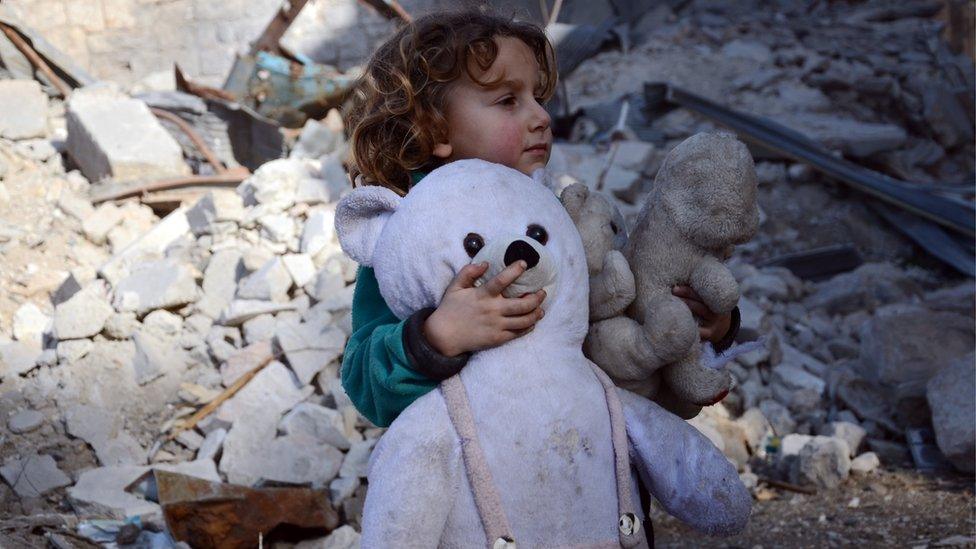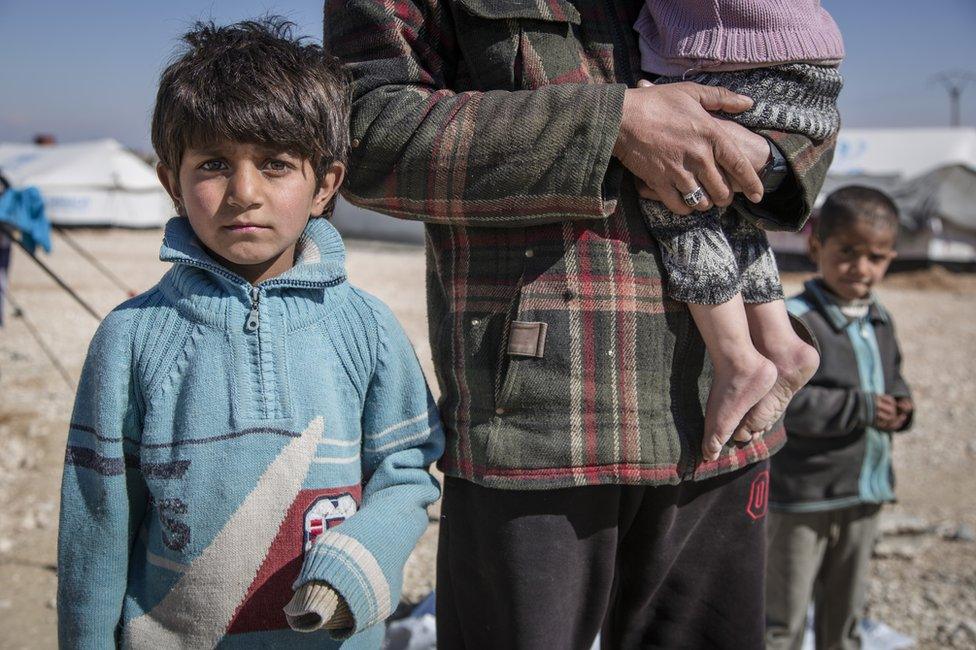Syrian children in state of 'toxic stress', Save the Children says
- Published

At least three million Syrian children under the age of six have known nothing but war
Millions of Syrian children could be living in a state of "toxic stress" due to prolonged exposure to the horrors of war, aid group Save the Children says.
The damage to an entire generation of children could soon become irreversible without immediate help, it adds.
The stress of war has led to increased bedwetting, self-harm, suicide attempts and aggressive behaviour among many children, according to a new report.
The findings are based on hundreds of interviews in Syria.
Save the Children says its study is the largest of its kind into the mental health and well-being of Syria's children amid the war, which began in 2011 and has left more than 300,000 people dead.
The report, Invisible Wounds, external, reveals a "terrifying mental health crisis among children trapped in Syria".
Save the Children spoke to more than 450 people in seven of Syria 14 governorates as part of its study, including children of varying ages, parents, caregivers, social workers, aid workers and teachers.
It found:
Almost all children and 84% of adults said that bombing and shelling was the number one cause of psychological stress for children
Two-thirds of children have either lost a loved one, had their house bombed or shelled, or been injured as a result of the war, according to adults interviewed (some had suffered more than one of these traumatic events)
71% of interviewees said that children were increasingly suffering from frequent bedwetting and "involuntary urination" - symptoms of toxic stress and post-traumatic stress disorder (PTSD)
48% of adults said they had seen children who had lost their ability to speak or begun to suffer from speech impediments since the war began
Nearly half of those interviewed said children "regularly or always have feelings of grief or extreme sadness"
Some 2.3m children have fled Syria, and at least three million children under the age of six have known nothing but war, the report says.
Toxic stress can disrupt the development of the brain and other organs and increasing the risk of addiction and mental health disorders in adulthood, said Alexandra Chen, a child protection and mental health specialist at Harvard University.
Syrian kids explain the war
"After six years of war we are at a tipping point, after which the impact on children's formative years and childhood development may be so great that the damage could be permanent and irreversible," said Dr Marcia Brophy, a senior mental health adviser with Save the Children.
"The risk of a broken generation, lost to trauma and extreme stress, has never been greater."

'They have seen things you wouldn't even see in films': A parent tells his story

Hisham and his five children fled their home in Deir al-Zour
Hisham (not his real name) is a school teacher from the eastern city of Deir al-Zour, which is partially held by IS and partially by the government.
He, his wife and five children have now fled to the al-Hol refugee camp.
When the war first started, he said, children in Deir al-Zour found the sounds of shelling entertaining, like a game, until their relatives and people they know started dying.
Soon, they were spending all their time on the streets "because there was nothing to keep them occupied", including schools.
His oldest child is nine, but "doesn't even know how to add one plus one".
"The children have seen all kinds of violence," he says. "They saw some of the violence through the television or the mobile, and some in real life. They saw things happening live, real things in front of them. You wouldn't even see most of the things they have seen in films."
Source: Save the Children

Research for the report was carried out in areas where Save the Children and its local partner organisations are able to work, which the group says are mainly opposition-held areas.
The report adds however that children in areas under control of the government or so-called Islamic State (IS) - where Save the Children is unable to operate - "are also likely to be experiencing traumatic events".
The aid group says that despite its pessimistic findings, the evidence suggested that it was not too late for the right support to be provided.
It said mental health and psychosocial support programmes were showing success and needed to be "scaled up" across Syria, with support from the international community.